‘Man Will Fly Forever’
A Conversation With Lt. Gen. John M. Omenda, Vice Chief of the Kenya Defence Forces
ADF STAFF
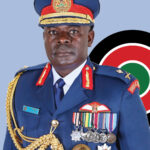 Lt. Gen. John Mugaravai Omenda was appointed vice chief of the Kenya Defence Forces in May 2024. Prior to that he spent three years as Kenya Air Force Commander. He joined the Kenya Air Force in 1991 and was commissioned as a 2nd lieutenant in 1992. He trained as a fighter pilot and also has trained in intelligence, security and flight safety. He is a graduate of the Defence Staff College of Kenya and the Royal College of Defence Studies, United Kingdom. He holds a diploma in Strategic Studies from the University of Nairobi, a bachelor’s degree in Peace and Conflict studies from Nazarene University, and a master’s degree in International Security and Strategy from King’s College, London.
Lt. Gen. John Mugaravai Omenda was appointed vice chief of the Kenya Defence Forces in May 2024. Prior to that he spent three years as Kenya Air Force Commander. He joined the Kenya Air Force in 1991 and was commissioned as a 2nd lieutenant in 1992. He trained as a fighter pilot and also has trained in intelligence, security and flight safety. He is a graduate of the Defence Staff College of Kenya and the Royal College of Defence Studies, United Kingdom. He holds a diploma in Strategic Studies from the University of Nairobi, a bachelor’s degree in Peace and Conflict studies from Nazarene University, and a master’s degree in International Security and Strategy from King’s College, London.
His tours of duty include serving as base commander at Laikipia Air Base and as deputy air force commander. He also served in the United Nations Mission in Liberia from 2006 to 2007. He spoke to ADF in Tunis, Tunisia, during the 2024 African Air Chiefs Symposium. The interview has been edited for space and clarity.
ADF: How did you come to make a career of being in the military?
Omenda: I desired it from childhood. I was fascinated by planes flying all over our local area into the training area. I schooled in our local town called Kakamega in the western part of the country, and then went all the way to Nairobi for high school. Immediately after high school, I could not resist the military because I was ripe to join. All my career has been in the military. The military takes over in giving you the necessary training to reach the right state.
ADF: What are the most pressing needs for your air force right now?
Omenda: Human resources. And of course, money is always an issue. Operating an air force is not a cheap thing; most countries find it very hard. There has to be a balance between security and other pressing needs like health, agriculture, education and so on. The country’s basic needs are rivaling the budget to support military operations. Operating an air force is quite expensive.
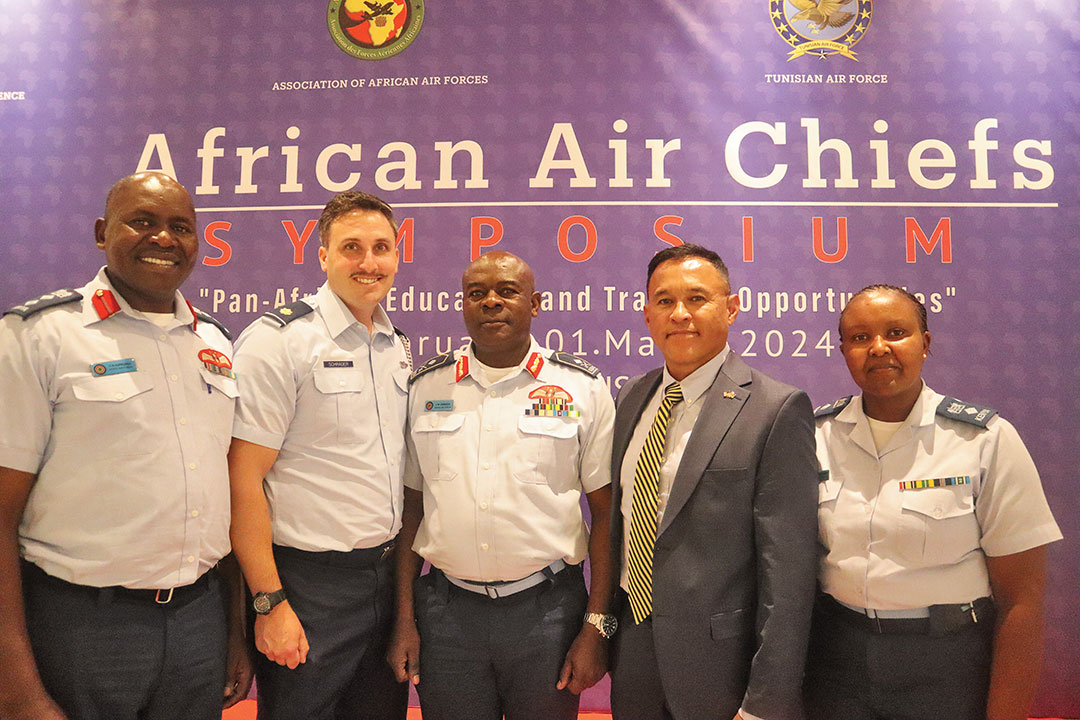
ADF: Drones are an emerging technology for many militaries. What is your air force’s plan for using drones?
Omenda: Yes, drones are the “in” thing. But remember, you get drones for a purpose. Any air force does its own acquisition of equipment, depending on the peculiar needs in the region. For us, they are important, yes, but not as important as they are in other regions. We have some, we are acquiring some, but they are dictated by the needs we have.
ADF: Are you using them for surveillance?
Omenda: Mostly surveillance, right, because they are cost-effective, they are easy to operate, they are cheaper, and therefore they add a lot of value. However, you have to supplement them with other equipment to be able to achieve the desired military target. Still, they save quite a lot, instead of using the real manned planes that are quite expensive.
The initial cost could be high, but the maintenance cost is bearable, and therefore you operate it for a long time, and it serves you longer. In the long run, it’s a cheaper option than a manned platform, because a manned platform requires a human being. You need to train the pilot, you need to train the technician, fuel it, bring it up, maintain it. In the long run, a manned asset is quite expensive.
ADF: Do you see drone use continuing to grow?
Omenda: You cannot replace manned platforms with drones. They will complement each other forever. I don’t see a situation or a time when manned platforms will disappear. It will not be possible. Man will fly forever. That you can take from me.
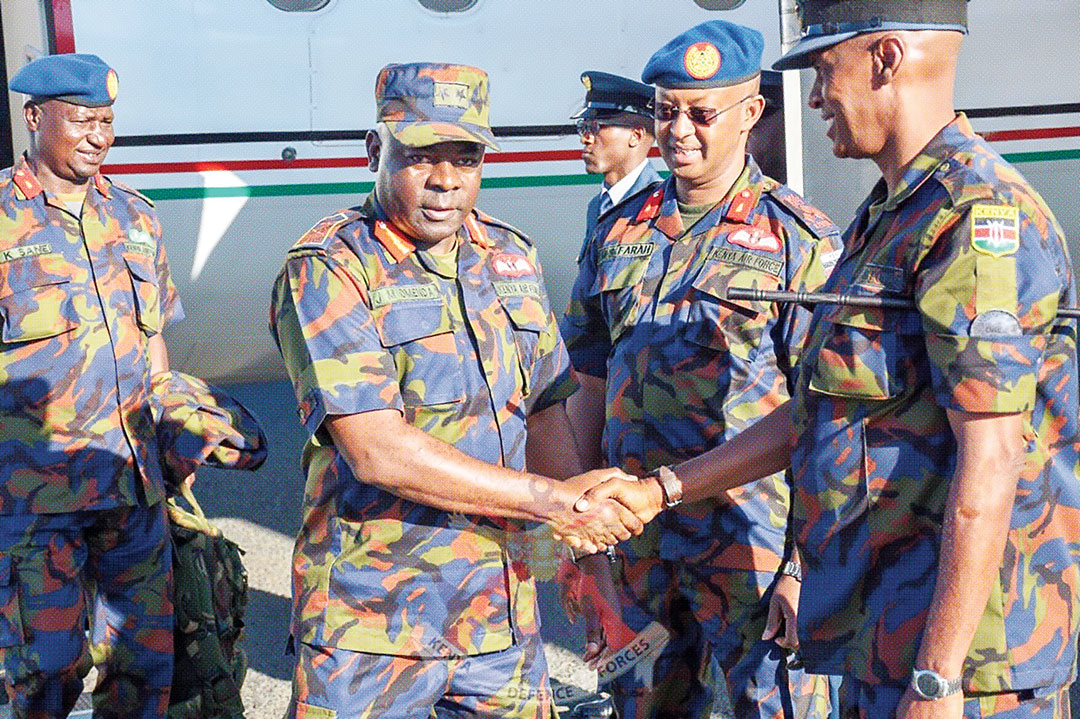
ADF: A lot of Africa’s air forces have a variety of planes, but only one or two of a specific platform. They’ll have 20 planes, but eight or nine different platforms. That can complicate maintenance and training. Is that a problem for your air force?
Omenda: You are right. The more variety you have, the more expensive it is to maintain. A certain type of aircraft requires certain special equipment to maintain it. If you have a big variety, then you have to have so many varieties of maintenance equipment. It’s cheaper if you have one platform. In the long run, we face the same problems. You can’t have one kind of aircraft because missions are varied. You must have helicopters, you must have fixed wings, you must have props, you must have jets, and therefore, you’ll have a variety. It’s not easy in the long run. If you can keep a certain type, for example, rotaries of similar type, jets of similar type and props of similar type, then you reduce the variety, which in the long run is manageable.
ADF: Military transport planes are becoming particularly critical in such areas as humanitarian assistance. Are you comfortable with the size of your transport fleet?
Omenda: No, nobody has enough. We always dream of large fleets, but, you know, they are all dictated by their costs to operate and maintain. I don’t have enough, for sure. I don’t have enough crew, I don’t have enough engineers and technicians. But at least we are maintaining what we have, and we are hoping that going into the future, we’ll be able to upscale and get the right numbers in place.
ADF: It’s hard to talk about the African armed forces without mentioning the effect terrorism is having. Kenya has had to deal with terrorist incidents in the past year. What role does the air force play in combating this problem?
Omenda: Professional armies and air forces are trained to conduct conventional war. Terrorism is not conventional warfare; it’s asymmetric warfare. We tend to rely on the rules of war in armed conflict, international humanitarian law and so on. Terrorism does not play by those rules, therefore it’s a challenge, especially for air forces. The air force, and the kind of equipment we have, we are not wired to fight terrorism. But we are learning fast, and we are having an effect in reducing the impacts of terrorism.
But let me tell you something: Terrorism cannot be stopped through kinetics — it cannot be stopped by war alone. Terrorism is manifested due to social problems, and if you need to win a war, you must identify the problems. Because it is a social problem, terrorism must be approached socially and supplemented by the use of kinetics to reduce its effects. It’s not all just about kinetics, the use of force. You need everybody on board, and the world needs to come together, because this transcends all boundaries. It’s not localized. It’s important that we cooperate against terrorism, but it’s a social issue that needs to be approached.
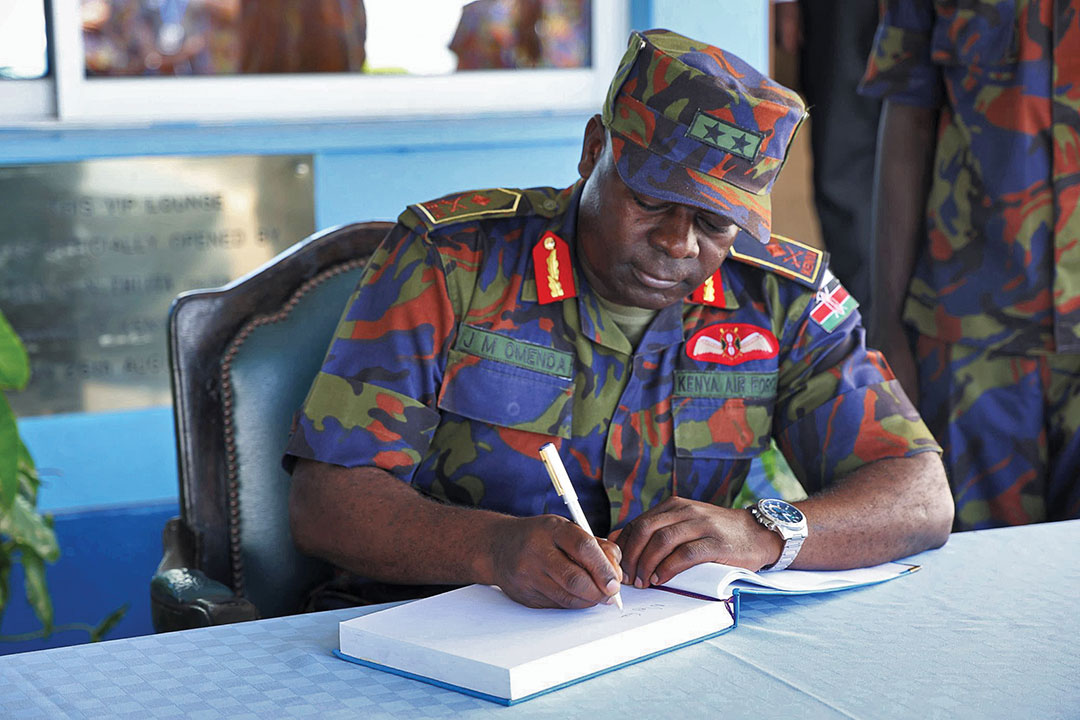
ADF: There is always talk about neighboring countries partnering to fight terrorism and address other problems. How do you view your relationship with the air forces of your neighboring countries?
Omenda: We do have a strong relationship. We have regional bodies that we subscribe to, for example, we have the East African Community. And we have the East African Community Regional Force, EACRF, that has been deployed in the eastern Democratic Republic of the Congo. We collaborate on so many fronts, we share resources and it’s working for us. However, other national needs make it a bit difficult to have a continuous kind of effect.
ADF: You’ve stressed the point that as big as your needs are, human welfare has to come ahead of the military.
Omenda: Yes, but you can’t do without military power. We are social human beings that make nations. And nations have needs, and nations are not self-sufficient. A lack of military can really expose you. If some rogue nation needs something that you have, you will be walked over, and that cannot happen. There is no single nation that can do without a military force. It’s a social issue; it is a necessity, and therefore they’ll be there to stay. From time immemorial, we even had local security forces guarding their own locality and resources against invasion, invasion from fellow humans. It’s unthinkable to be without some kind of defense. You’ll be vulnerable, and you’ll lose everything.
ADF: Officials at the 2024 African Air Chiefs Symposium in Tunisia have emphasized the need for more training and better treatment of female personnel. How do you think Kenya is doing in these regards?
Omenda: We are doing very well. Remember, Kenya is different. As far as women in uniform are concerned, we have a peculiar case. From the onset, we had female military personnel. Kenya Defence Forces was formed with women on board. They were a specialized unit serving a specialized need and were specifically attached to the army. But they served across the services in the navy, the air force, whenever they were needed. However, in 2002, there was a policy shift that they should spread across the services and don service uniforms. They were disbanded and distributed on certain ratios. Now, every service recruits its own female personnel depending on the needs, because a military is a specialized service. And for us in Kenya, we don’t recognize percentages, but we give women good opportunities, especially where they perform well. And we’ve seen tremendous results in that. The numbers just come up by themselves. Right now, they are quite high by African standards.
ADF: Some United Nations peacekeeping missions have struggled recently in Africa. Do you have any thoughts on the future of peacekeeping missions in Africa?
Omenda: Peacekeeping missions will always be there because peace and security are part and parcel of the human need. So long as there are conflicts, there will be need for peacekeeping missions, and therefore, resolutions will still be passed by the U.N. to have peacekeeping missions in any conflict zone. However, the clause that says that the country should be willing to accept the mission is the weakest link. I foresee a case whereby the international community can force a peacekeeping mission in a region if need be. If it affects the region and the world, then a decision will have to be made. The future of peacekeeping is still there, and there is still a need, in my own opinion, so long as there is conflict.

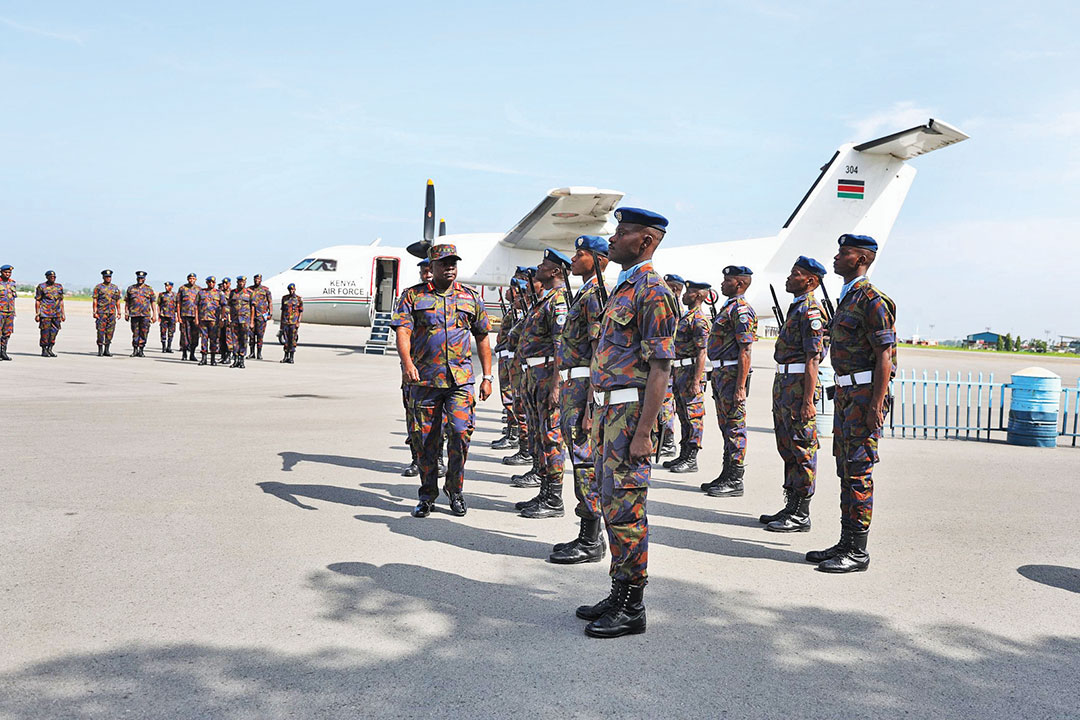
Comments are closed.